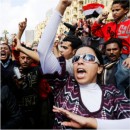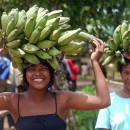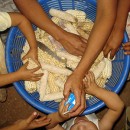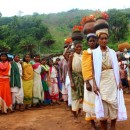Tuesday, April 12, 2016
News and Views from the Global South
Headlines
Panama and Pajama Games
Offshore accounts are nothing new. Their semi-legal and unethical status is well known. Corporate and crony capitalism produce outrageous inequality and concentrations of economic and political power. The wealthy and powerful of the world have secretly stashed away in excess of $20tr in offshore and other tax havens. Moreover, the vast majority of such activity is criminal, illegal or politically unacceptable. Even the inimitable Donald Rumsfeld might agree all this is a “known known.”
Stepping Out of the Cocoon
To encourage more young women into community media and journalism, and to work for the development of rural communities, in 2013, Bangladesh NGO's Network for Radio and Communication (BNNRC), in partnership with Free Press Unlimited (FPU), launched a three month fellowship programme entitled “Youth women in Media and Journalism”. In the programme, an experienced mentor trains the attendees how to produce news, reports, features, case study and human profiles.
Opinion: Africa, the Need for Greater Integration
There is a misconception, by some, that the World Trade Organization (WTO) is a barrier to regional integration. It is one of a number of misconceptions that do not match up with the facts like the perception that the WTO is a rich man's club. Today the WTO has 162 members and rising at all stages of development. 43 of those members are African countries and rising. The organization now covers around 98% of world trade. It is a truly global organization, one where everybody has an equal say. And it is an organization which supports regional integration in Africa. Indeed, I would say that the need for better integration across the continent is indisputable.
Conserving the Hilsa
Bangladesh has decided to set up a Hilsa Conservation Trust Fund (HCTF) to protect this fish from over-exploitation due to population growth and effects of climate change.Baby Steps on Long Road to Justice for Atrocities in Syria
The negotiations on April 11, 2016 in Geneva and the recent reduction of hostilities in Syria may represent important steps towards a peaceful solution to more than five years of turmoil. Few would not welcome the guns falling silent once and for all and for an end to the suffering of civilians.Sliding Scale
That Pakistan is a hostile terrain for women is widely known. The vast majority of the poor have little choice but to carry on with life as best as they can, holding out in the hope that the state and its set of laws, law enforcement and justice systems will be able to protect their freedoms and dignity.
Plan for Poorer Countries to Fund HIV Response Raises Concerns
Calls for low and middle income countries to contribute an additional 6.1 billion dollars to the global HIV response by 2020 could see some vulnerable groups left behind, said HIV activists meeting at the United Nations last week.
Focusing on Future of Food: What’s Next for Global Agricultural Research?
Food security scientists from around the globe gathered in Johannesburg last week with one objective: to work towards the transformation of agriculture as engine for growth in developing regions of the world. The gathering was also an opportunity to examine what farmers need to prosper in the face of social and environmental challenges.
The Panama Papers: A Global Report Card
On Sunday, 3 April, the International Consortium of Investigative Journalists released an unprecedented leak of documents exposing the secretive financial dealings of some of the world’s richest and most powerful. Few countries are safe from the findings; twelve current or former heads of state are implicated among 143 politicians, their relatives and associates for using offshore tax havens.Flexible Microfinance Models – For More Economic Opportunities
Bangladesh is ground zero for microfinance. Over the decades, since Sir Fazle Abed founded BRAC and Muhammad Yunus started Grameen Bank, the strategy of providing micro-sized loans to borrowers has helped increase income and consumption for the poor, ensured food security for many, created employment opportunities, and empowered women. According to the Credit and Development Forum, nearly 700 microfinance institutions operate in the country today, disbursing approximately Tk. 647 billion (Tk. 64,700 crore) to 3.4 crore active borrowers. The microfinance sector now contributes about 10 percent of GDP and generates approximately 250,000 jobs.
Ethiopia’s Smoldering Oromo
The Ethiopian government's most serious domestic political crisis in more than a decade began over a scruffy football field appropriated by local officials for development.Development Without Equity
I could not find a parking spot on the side road and saw that some cars were parked off the main road. So I tried parking there. A traffic warden came up to me and said I could not park my vehicle there. I asked him that since some cars were already parked there, why could I not do the same.Historic Victory for Investigative Journalism
The world was shaken up this week with the leaks of the ‘Panama Papers’ exposing the financial shenanigans of world leaders, past and present. They showed how such leaders of men, women and nations and their business side-kicks hid their embezzled wealth in tax havens around the world and thereby avoided paying taxes in their respective countries. They enjoyed the good life with their monies stacked in offshore banks, some using shell companies with front-men as the account holders, while their fellow countrymen and women were asked to pay their taxes.A Promising Start for a High Seas Treaty
Delegates from 83 countries came together at the United Nations from March 28 to April 8 for the first in a series of landmark meetings on ocean protection. This Preparatory Committee will help forge an agreement to determine how nations move forward to protect the high seas—the 64 percent of the ocean that belongs to everyone but is governed by no one.Clash or Dialogue?
The emergence of a global village, where people from different civilisational bacle grounds are coming together in increasing numbers to work, study, and live together, is creating fault lines that often erupt in violence.Next Page »
















